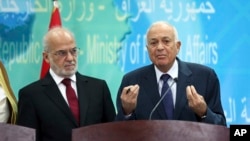A high-level Arab League delegation met with Iraqi leaders Sunday, expressing support in the country's battle against the Islamic State group and terrorism.
The visit by Arab League chief Nabil El-Araby and two other top diplomats to Baghdad appeared to signal a rapprochement between Iraq and its mostly Sunni Arab neighbors.
Araby noted he and his colleagues, Kuwaiti Foreign Minister Sabah al Khaled al Sabah and Mauritanian Foreign Minister Ahmad Ould Teguedi, had met with Iraq's top leaders and were hoping to help “stabilize” the country in its conflict against Islamic State militants.
Araby said the Arab League would like to see progress and stability in Iraq despite the difficulties it now faces. He added that the entire Arab world is facing a period unlike any it has gone through, including ideas and ideologies incompatible with the modern era.
Entire world
The Arab League chief said the terrorism taking place on Iraqi soil is the responsibility of the entire world.
In a joint news conference with the Arab League delegation, Iraqi Foreign Minister Ibrahim Jaafari said the new spirit of relations between Iraq and its neighbors is the product of a series of recent joint meetings, including a conference in Saudi Arabia last month.
Jaafari noted some Arab states have pledged to help Iraq with arms, humanitarian aid, logistics, air power, intelligence and training. He added they would not be sending ground troops.
An Arab coalition including Saudi Arabia, Jordan, Bahrain, the United Arab Emirates, Kuwait and Qatar have been working with the U.S. and Britain, France and Australia, to conduct airstrikes against Islamic State militants who have seized wide areas of Syria and Iraq.
Kuwait's foreign minister said Arab states must work together to battle the extremist ideas of Islamic State militants.
Sabah al Khaled said the Arab League is offering various sorts of aid to Iraq, since all Arab states are facing the same terrorist threat and must unite to fight it.
He noted Arab states pledged to support the Iraqi government at a conference in Jeddah on September 11, both politically and with humanitarian aid and by stopping extremist ideas and financial support from nearby states.
Cooperation needed
Iraqi parliament member and former national security adviser Mowaffak al Rubaie told VOA that closer cooperation between Iraq and the Arab League is needed to help put a stop to terrorism.
"The Arab League should get engaged more and more with Iraq, especially in its fight against ISIS, and also in national reconciliation," said al Rubaie.
"We need to mobilize all our resources and encourage members to make it difficult for any money transfers to ISIS from Arab countries, movement of young men from these countries to Iraq and also any logistical or political support from the Arab League," he added.
Iraqi Prime Minister Haidar al Abadi reiterated Sunday that his country would welcome all forms of aid from Arab and Western coalition allies, but would not like anyone to send ground troops to help fight Islamic State militants.




